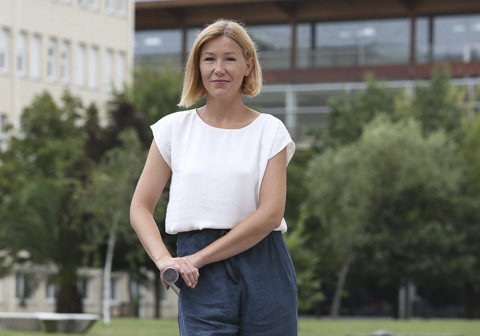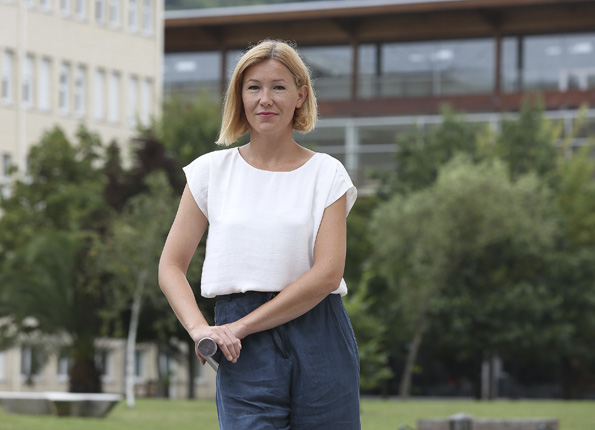A piece of collaborative research between the UPV/EHU and Utrecht University (the Netherlands) has explored the strategies to protect well-being used by voluntary immigrants and refugees, populations that have hardly been studied at all until now. They have seen that these groups do not always resort to the strategies put forward by other authors as universal when facing the feeling of rejection: ethnic identification (with the country of origin) and national disidentification (with the host country).
Ethnic identification mitigates the distress of immigrants who suffer racism
The UPV/EHU-University of the Basque Country and Utrecht University have confirmed that not all immigrants seek support in their ethnic groups, even though it may be beneficial
First publication date: 11/08/2017

Ethnic and racial discrimination may lead to serious consequences in the well-being and health of the ethnic minorities that suffer it. But beyond turning into passive victims and accepting their low status, "these minorities may resort to different ways of tackling the negative consequences of social rejection," explained Magdalena Bobowik, researcher in the UPV/EHU's consolidated Social Psychology research group that conducted the study.
"In our research we wanted to test two theoretical models relating to the attitude that may be adopted by these groups to tackle or minimize the effects of discrimination on their well-being, because previous pieces of research have failed to provide very consistent results. We also wanted to test them on two social groups that have been little studied or not studied at all until now: voluntary immigrants and refugees or forced immigrants," specified Bobowik. Firstly, these models were the rejection-identification model that postulates that when facing a situation of rejection by the host society, immigrants identify with and seek refuge in their own ethnic groups. And secondly, the rejection-disidentification model which postulates that when facing a situation of rejection, the reaction of these individuals is to distance themselves from the majority group.
"These models have been presented as universal ones, but to contrast them, studies have been overwhelmingly conducted on international students, or on older people, and to a lesser extent on immigrants who have spent less time in the host country and who are in a situation of greater social exclusion or who experience greater sociocultural difficulties, or on refugees, in particular. That is the gap we wanted to fill with our research," she pointed out. "We tried to test these two models in two different cultural contexts and on two different samples of immigrants: voluntary immigrants in the Basque Country, and refugees in the Netherlands. We also looked at people of different nationalities, so we could see the differences and nuances that mark the characteristics belonging to each culture".
The more resources there are, the less ethnic identification there is
The results of the study highlight that it is not possible to speak of universality in these models. The researcher explained it thus: "Many factors come into play in these matters, such as the coping resources that people have, their social status, the cultural or linguistic proximity with the host country, etc., and they all cause the protection mechanisms against discrimination to function differently".
So the voluntary immigrants studied in the Basque Country turned out to be the type of immigrants that displayed the greatest distance from these two models. "The groups we studied here were Bolivians, Colombians, Sub-Saharan Africans, Moroccans and Romanians. In the results we were able to see, firstly, that in situations of rejection none of these groups identify themselves more closely with their ethnic groups; rather the opposite occurs: they disidentify themselves from their reference ethnic group. It could be that immigrants in this context and the groups we studied in particular come up against fewer sociocultural difficulties compared with the refugees in the Netherlands". Secondly, the disidentification with the national group "was in fact perceived in all the groups studied, but was not associated with greater well-being among Colombians and Romanians. These two groups can be regarded as somewhat more integrated, or as less stigmatised minorities, compared with others included in the study, so they are able to opt for other strategies for managing identity and coping".
With respect to the forced immigrants studied in the Netherlands, the researchers did confirm greater identification with their ethnic groups as well as disidentification with the national group. "These people have spent less time in the host country and come from cultures much farther removed from Dutch culture, so the only way they can protect their well-being against discrimination is to seek refuge in their ethnic groups," explained Bobowik.
Finally, one of the most important ideas that were found to be reinforced in the study is the fact that "ethnic identification and national identification improve people's well-being and this opens up the doors to us for further study. One could, for example, explore the effect of the strategies encouraged by biculturalism or multiculturalism in the integration and well-being of immigrant people. In this study we dealt with national and ethnic identification as independent variables, but working on them together might show that the bicultural strategy is the one that most reinforces well-being," she concluded.
Additional information
The UPV/EHU's Department of Social Psychology and Methodology of Behaviour Sciences and Utrecht University (the Netherlands) collaborated to produce this study. 1,250 people from Bolivia, Colombia, Morocco, Sub-Saharan Africa and Romania participated in the study on voluntary immigrants in the Basque Country carried out in collaboration with the Ikuspegi Observatory on Immigration, and 2,923 people from Iraq, Iran, Afghanistan and Somalia participated in the one on refugees in the Netherlands.
Bibliographic reference
- 'Healthy' identities? Revisiting rejection-identification and rejection-disidentification models among voluntary and forced immigrants
- European Journal of Social Psychology (2017)
- DOI: 10.1002/ejsp.2306



